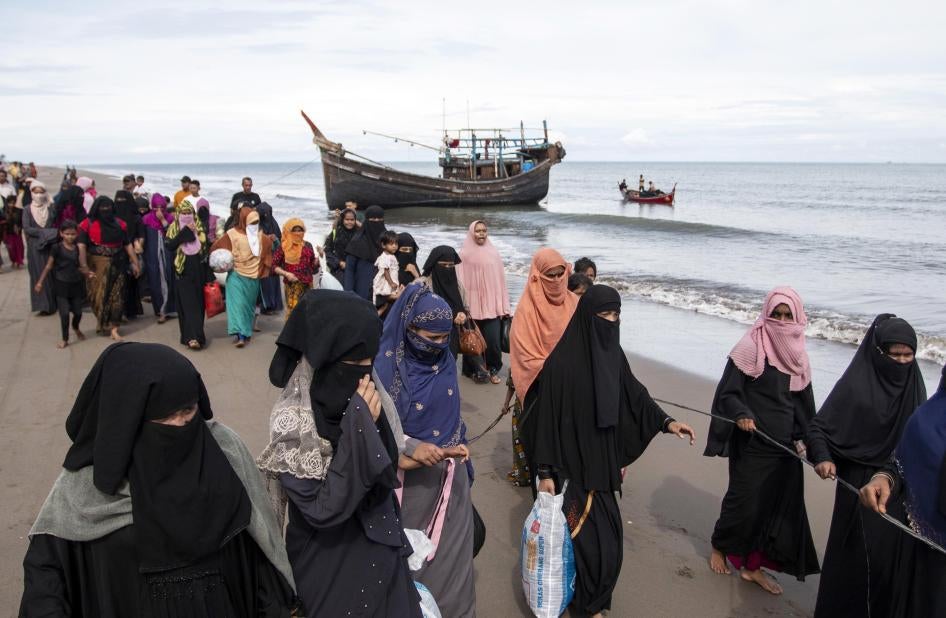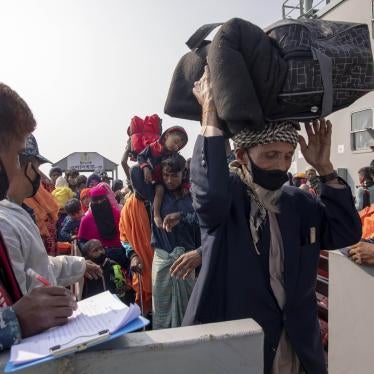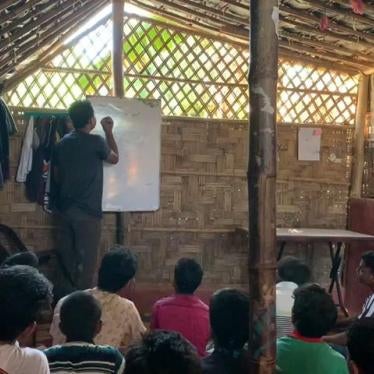It's been happening for a decade. Every year as South Asia's monsoon season ends in late October and the dry season begins, rickety boats overloaded with ethnic Rohingya leave Bangladesh and Myanmar. They head into the Bay of Bengal, en route to Malaysia, for the promise of work and greater freedoms. Many of these boats never reach their destination, and over the last few months - as in previous years - hundreds have drowned at sea.
This week, ministers from across the Asia region are convening in Adelaide for the 8th Ministerial Conference of the Bali Process on People Smuggling, Trafficking in Persons and Related Transnational Crime, an intergovernmental forum co-chaired by Indonesia and Australia. The dire situation facing Rohingya at sea should be at the top of the meeting's agenda.
This year's sailing season has been one of the deadliest yet. The United Nations refugee agency, UNHCR, says that of more than 3,500 Rohingya who attempted sea crossings in the Andaman Sea and Bay of Bengal in 2022, nearly 350 died or are missing at sea. "Confirmed reports are, however, only the tip of the iceberg," UNHCR noted. "Given most bodies are never found and many missing persons never reported."
Family members of Rohingya recently stranded at sea told Human Rights Watch that their relatives encountered Thai and Malaysian naval authorities who refused to help them.
Dil Mohammad's sister-in-law left the camps in Bangladesh in late November.
The smugglers or traffickers "moved them around to different places for 25 days before the main boat started its journey toward Malaysia," he said. "[They] gave them food as long as we kept sending them money."
The boat engine broke down off the coast of Thailand and they were stranded at sea. "My sister-in-law said they weren't given food or drinking water for six days. She could barely talk, her voice was fading. My niece stopped talking and stopped crying, too."
Nurul Amin's sister left the Bangladesh camps in November to join her husband in Malaysia. When the boat broke down, he said, children began dying. He said a Thai navy vessel approached the stranded boat in December. "Four Rohingya jumped into the sea thinking the navy boat would rescue them," Nurul said. "They were never found. The navy boat didn't rescue anyone."
Several rescued boats carrying hundreds of Rohingya have disembarked in Aceh, Indonesia, after weeks at sea without food or water, with dozens dead. Others remain at sea. One boat with about 180 Rohingya has been missing since December, with all on board presumed dead.
Many of the Rohingya embark on these high-risk journeys to escape growing restrictions and hopelessness in refugee camps in Bangladesh and unending oppression and violence in Myanmar's western Rakhine State. They flee out of desperation and vulnerability, knowing they face weeks or months on unseaworthy boats, subject to abuse by smugglers and traffickers, at risk of starving or drowning at sea, only to confront the threat of forced labor, exploitation, or immigration detention. They pay US$700 to $2,000 for the journey.
UNHCR estimates that as many as 170,000 Rohingya embarked on smugglers' boats from 2012 to 2015. Following the peak of the crisis in May 2015, the Bali Process reviewed the regional response and members acknowledged that "unilateral, unplanned and unprepared responses led to deaths, inadequate/delayed access to basic services, refusal of landing/entry."
The resulting 2016 Bali Declaration set out a comprehensive approach to irregular migration in the region, centred on protecting the needs of refugees and migrants. A consultation mechanism and task force were set up to improve the emergency response to refugee flows, including "detection, search and rescue, disembarkation and shelter management."
But the emergency response mechanism has never been activated.
At the Ministerial Conference this week, officials should make good on their commitments from six years ago. Responsibility for the security of the Rohingya rests primarily with Myanmar, but extends to the countries where they seek refuge and the broader international community, which can provide resources and support.
Burden sharing and collective responsibility, as called for in the Bali Declaration, demands action, not just words: responding to refugee boats in distress, coordinating search-and-rescue operations, taking boats ashore to the nearest safe port, and providing humanitarian aid. Turning away boats at sea violates international law and abandons a community that has faced abuse and neglect everywhere they turn.
Governments endorsing the Bali Process should pledge to assist the Rohingya with work and residency permits and exert coordinated and unified pressure on the Myanmar junta to end the abuses that compel Rohingya to flee.
Meanwhile, the dry season, and the departure of boats, continues through May. Bangladesh's tightening of security has led smugglers and traffickers to move people overland into Myanmar before setting sail.
"Sometimes, the people on the boats get arrested," a Rohingya man said. "Sometimes the boats sink and they die in the sea. But people still take the risk, because they say they can't stay at home detained in the camp, and they don't think they will ever be free."










